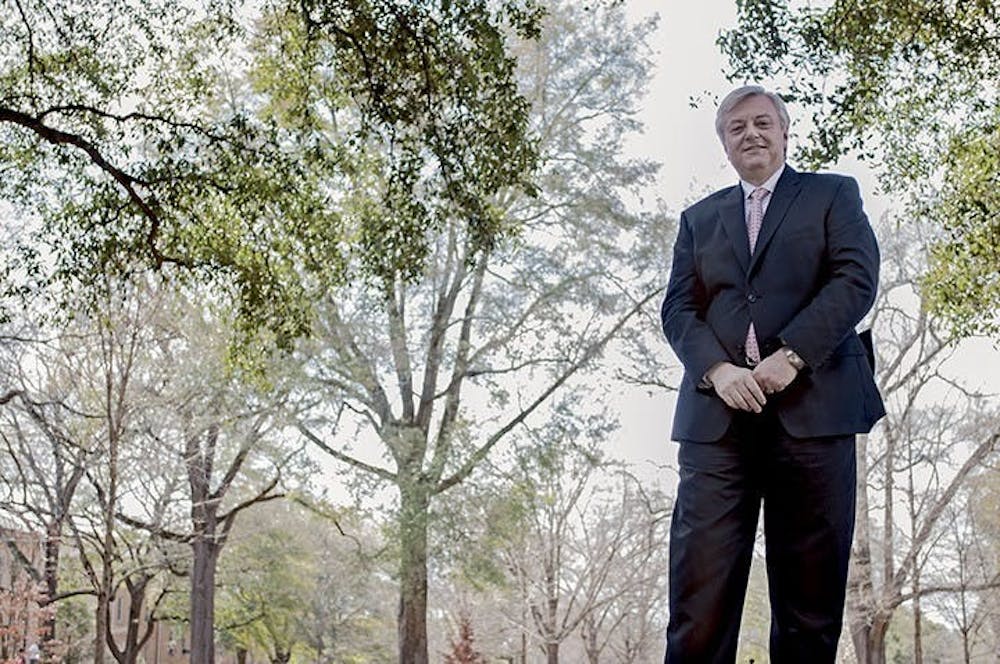Michael Amiridis, the finalist to become USC's next university president, is speaking to the USC community on a Microsoft Teams call Friday morning. Following the forum, the university board of trustees will meet at 2 p.m. in the Alumni Center. "Presidential election" is the last item on the agenda.
USC released Amiridis' name, CV and other application materials Friday morning.
Amiridis, the chancellor of the University of Illinois Chicago, worked at USC for 20 years before leaving.
He started as an assistant professor of chemical engineering at USC in 1994 before serving in multiple leadership positions and ultimately becoming the executive vice president for academic affairs and provost in 2009. He served in this position until he left for Chicago in 2015.
When the university experienced a 21% cut of state funding in 2010, Amiridis worked closely with other leaders to continue providing opportunities for scholarships for students and also worked to prevent the closing of the popular student writing center after budget cuts in 2010. However, throughout his time as provost, he came under fire for the university increasing tuition and fees.
The Microsoft Teams call was announced midday Thursday and comprised of three sessions.
The first session, from 9 a.m. to 10 a.m., is focused on academic excellence. The second session, from 10:15 a.m. to 11:15 a.m., is focused on research and innovation. The third — and shortest — session, from 11:30 a.m. to 12:15 p.m., is focused on system-wide excellence and diversity, equity and inclusion.
Any questions the public wants to ask the candidate during the meeting must be submitted to a moderator. After the sessions, the public may submit an evaluation of the candidate to the board of trustees, the email said.
This comes after Mung Chiang, who The Post and Courier reported in December was the university's top pick, withdrew his name.
Before Chiang withdrew his name, he was set to meet with students, faculty and staff on Dec. 9, during final exam week, university spokesperson Jeff Stensland confirmed. The meeting never took place.
The presidential search committee began interviewing 20 candidates in early November, according to reporting by The State.
The search process has already come under scrutiny, as USC donor and the owner of the Nephron Pharmaceuticals Corporation Lou Kennedy resigned from the presidential search committee in November.
The incident occurred while the committee interviewed candidates for the position of the university president.
Carol Harrison, the president of USC's chapter of the American Association of University Professors (AAUP), said she would have liked more finalists to come to campus.
"You learn a lot about a candidate by seeing him or her on campus, interacting with the university's executive leadership, their faculty, their students. And I'm sorry we didn't have the opportunity to do that," Harrison said.
The previous presidential search, which resulted in hiring former university President Bob Caslen, was full of controversy.
Because of concerns "related to the propriety of the 2018-19 presidential search and undue external influence in the search itself," the accrediting board reviewed the presidential search process.
In its review, the university's accrediting agency, the Southern Association of Colleges and Schools Commission on Colleges (SACSCOC), found in early 2020 that the presidential search process for hiring Caslen breached two standards.
In response to this, the university enacted multiple changes to its presidential search process, according to its monitoring report to the SACSCOC.
"The Board has enacted multiple innovations: a Code of Conduct and Oath of Office for Trustees, a policy for protecting the Board and USC System from external influence, a policy outlining the fiduciary duties of Trustees, a revised orientation program for new Trustees, and a new continuing education curriculum for Trustees," the monitoring report said. "The Board has revised its committee structure, and the new Governance Committee will serve as the body for further assessment and revisions of governance policies and procedure."
After making these changes, the university was removed from monitoring status in early 2021.
"While only time, and the opportunity to conduct a new presidential search, will tell whether these changes made the intended difference, the charge to the Special Committee was to assess whether the enacted changes offer reasonable strong protection against a similar crisis occurring in the future," the SACSCOC said in response to USC's monitoring report.
SACSCOC has no complaints about the current presidential search process, a representative told The Daily Gamecock on Dec. 6.
Editor's note: This is a developing story.
- Sydney Dunlap contributed to reporting in this article.

